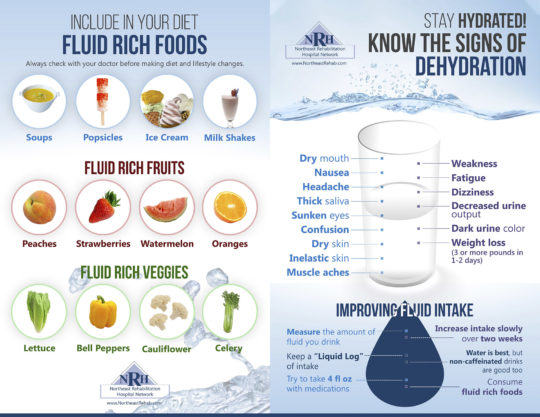Tips to Stay Hydrated and Avoid Dehydration

Stay hydrated and avoid dehydration. Up to 60% of the body is water. Fluid plays an important role in maintaining body temperature, carrying nutrients throughout the body, increasing mental awareness and lubricating joints and cushions.
Getting enough fluids to stay hydrated is important for everyone especially as dehydration can affect your health. Dehydration can cause increased fatigue, decreased blood pressure, decreased concentration, headaches, or muscle aches. It can put you at risk for urinary tract infections, constipation, dizziness, and falls.
People who have medical and functional challenges, as well as the elderly population, often do not consume enough fluid, which can lead to dehydration. This may occur because they are not feeling well, have a decreased thirst sensation or perhaps are not able to consume liquids as easily.
Stay hydrated and avoid dehydration with this helpful Q&A that offers tips for getting enough fluids:
How much water should I drink?
Fluid needs are not the same for everyone. We often hear the recommendation for eight, 8 oz glasses a day, but needs vary from person to person depending on weight, activity, and medical history. The questions and answers below will help you understand the signs and symptoms of dehydration and overhydration.
What liquids or foods will help with hydration?
Not all liquids are the same. Some, such as juice and soda contain a lot of empty calories from sugar. Others, such as soda/coffee/tea, contain caffeine that can act as a mild diuretic. Water is one of the best choices, but if you don’t care for water try these tips:
- Add an ice cube of juice for flavor, or fresh fruit/cucumber/ginger/mint, etc.
- Consider soda water.
- Include fluid rich foods in your meals and snacks. Watermelon, strawberries, cantaloupe, peaches, oranges, cucumbers, celery, tomatoes, and peppers are all great options. These fruits and vegetables each provide about 1/2 cup of fluid for each cup consumed. Plus, they are rich in fiber and antioxidants!
- Foods such as ice cream, milkshakes, popsicles, and soups also count as fluid.
What are some habits that can help with increasing hydration?
- Keep fluids within reach.
- Set a timer as a reminder to drink.
- Keep a fluid log or journal. You can use an app or a notebook.
- Measure the volume of the cups/mugs that you are using at home to determine how much fluid you may already be drinking.
- Consider adding an additional 4 oz of fluid when taking your medications.
How do you know if you are dehydrated?
Some of the early warning signs and symptoms of poor fluid intake include dry mouth, thick saliva, increased thirst, nausea, poor skin turgor – inelastic skin, dry skin, sunken eyes, confusion, headache, or muscle ache. You may also feel weak or more fatigued. Sometimes, you may feel dizzy, especially when going from sitting to standing. Urine output is also a good indicator. If you are urinating less or your urine is dark, you may be dehydrated. Another indicator can be weight loss. You could see a weight change of three pounds or more in one to two days.
What if someone is concerned about drinking too much due to incontinence or frequency concerns?
Bladder issues and concerns with incontinence or urgency can cause people to limit their fluid intake. A nice way to combat this is to slowly increase fluid intake. Increase fluid by 4oz every two or three days until you reach your fluid intake goal. For most people your body will adjust and your bathroom needs will not increase.
Is it possible to get overhydrated?
More is not always better. There is such a thing as too much hydration, especially for people that may have kidney disease, heart failure, or other medical conditions. If you are overhydrated, you may experience shortness of breath, swelling in the arms and legs, confusion, and increased urination. It’s best to contact a physician as soon as these symptoms occur.
There are many ways to stay hydrated and avoid dehydration. By getting enough fluids from food and drink you can realize the health benefits of healthy hydration. We hope these tips for getting enough fluid helped. Remember to drink and eat plenty to keep you and your family hydrated.
by Wendy Jeffco, Registered Dietitian, Northeast Rehabilitation Hospital



